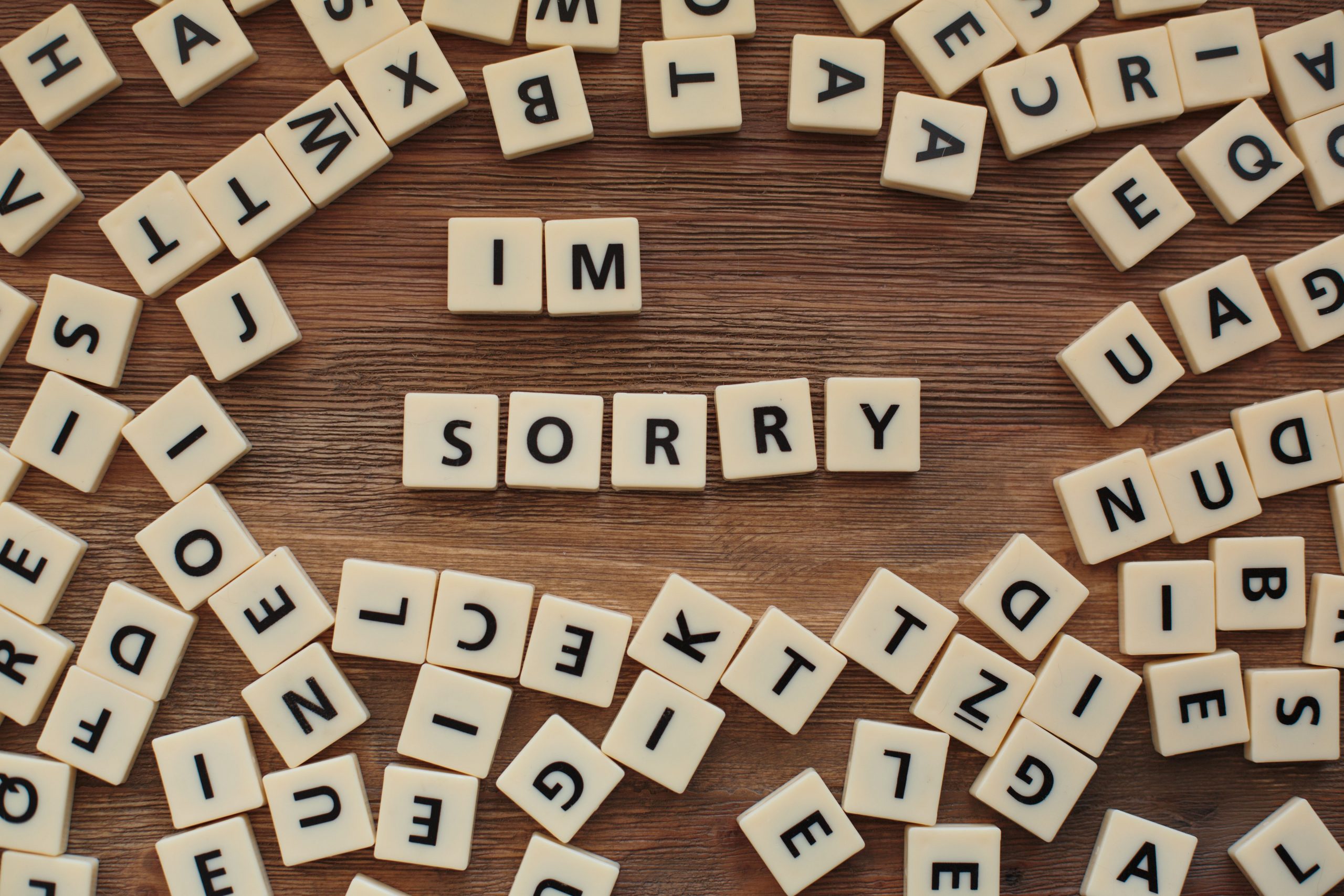Carla Carlisle: Love doesn't mean never saying sorry — it means saying you’re sorry with some frequency
Carla takes aim at the shamelessness of those who lead the country into disaster and stroll off without a word of apology.


Exquisite houses, the beauty of Nature, and how to get the most from your life, straight to your inbox.
You are now subscribed
Your newsletter sign-up was successful
My old friend Ena planned every detail of her funeral. When she told me that she had written the eulogy to be delivered by her daughter, I said: ‘Don’t you think that’s cheating?’ ‘No!’ She snapped. ‘I want to set the record straight. I was a very good mother!’
When the day arrived, the dutiful daughter read her mother’s script. Word for word. I don’t remember Katie looking up once. What I’ve never forgotten was the exit music: Edith Piaf’s Non, je ne regrette rien.
I could see the humour in her choice. Luckily, I prefer Piaf to Sinatra and I think we’ve all had enough of I did it my way. It required rather more effort to see the funny side at the wake back at the house, when we were served Prosecco. After she was diagnosed with her fast-moving cancer, Ena asked me to get four cases of Champagne from the Wine Society for her ‘Kingdom Here I Come’ party. ‘Your Champagne!’ Katie said. ‘Mother called it her Twilight Wine. She claimed it was the only thing that agreed with her. She ordered the Prosecco from Tesco last month, insisting the “hangers on” wouldn’t know the difference.’
Ena’s exit plan included her property and chattels. When her son and daughter met with her solicitor, they learned that the family home was a sliver of its former self, as Ena had gone the full hog of equity release. ‘We weren’t banking on a grand inheritance,’ admitted Katie, a primary-school teacher who, like her brother, an expert on lemurs, radiates pure goodness. It’s one of those miracles that defies science: they are self-made people who show no trace of their gene pool.
I don’t always think of Ena when Prosecco is served, but I do when I hear Je ne regrette rien. It’s no longer a song that reminds me of rainy nights in Paris and black-and-white movies with Jean Gabin smoking Gauloises. Now, it makes me want to howl, because it has become the anthem of our crazy age. I don’t blame the world of ‘social media’, where you can be an anoymous rat, spread suicidal despair and feel no remorse. This Age of No Remorse pre-dates Snapchat. I reckon it has litigious origins. Remorse triggers guilt triggers litigation. If you open your car door without looking and knock someone off their bike, you’re advised not to apologise. Pity about the unlucky cyclist’s bloody mouth, but keep quiet. You’ll be paying with your back teeth if you admit carelessness.
"Once she took to drink, Ena had the maternal skills of a sniper"
You probably see where this is going. Straight to the politicians we elect to lead our country. No matter what trembling uncertainty they create in peoples’ lives, no matter how many trees they uproot, how much hope and faith they crush, how many dreams they deny — they simply can’t say ‘I’m sorry’. Even the apologies wrung from them are minimalist mutterings, formulaic passwords carefully constructed to give them a free pass. Big crimes and small crimes, the mantra is ‘He/she apologised’ — an abbreviated use of language that is a ‘Get-out-of-Hell Free’ card and enables the confessor to continue roaming through the corridors of their crimes.
I admit I cried when Ali McGraw died at the end of Love Story, but I knew the film’s famous line — ‘Love means never having to say you’re sorry’ — was ridiculous. I couldn’t believe the classicist at Yale kept it in his second draft. In my experience, love means it’s a good idea to say you’re sorry with some frequency and look your elected one in the eye as you say it.
Exquisite houses, the beauty of Nature, and how to get the most from your life, straight to your inbox.
Once she took to drink, Ena of No Regrets had the maternal skills of a sniper. Luckily, her children — and most of her friends — were old enough to get out of the way. The damage done by elected leaders who cock up and let down their country is another story. Regular folk can’t get out of the way so easily. Leaders owe it to those who chose them — and those who did not choose them — to say they are sorry when they have made choices that turned out to be wrong.
I’ve often wondered if the light and sound of history would have been different if, instead of announcing he would not seek re-election, Lyndon Johnson had told the American people that the Vietnam War could not be won. That the deceptions, fabrications, deliberate distortions were made by decision-makers who didn’t know what they were talking about.
"Remorse doesn’t end our primal rage and cynical despair, but it helps to humanise the powerful and comfort the powerless"
The same confession could be made by the youthful prime minister who led his country into a war in Iraq. And, what if the disenchanting prime minister who ‘gave’ us a referendum had said ‘I’ve got to make this work’, instead of walking away with a cheery whistle?
As for the stream of prime ministers standing around in Downing Street lately, did the Latin scholar say ‘Mea culpa, mea culpa, I got this wrong’? Did anyone say ‘I said it was a piece of cake, but it turned out to be a quagmire’? Or ‘I said it would be £10 billion and it is going to be £400 billion’. Did you hear ‘I betrayed your faith in me and I am sorry’?
Regret seems to be about the loss of face, loss of privileges, loss of salary, car and driver. Remorse is something altogether different. It may not patch up the damage, the mess, the pain, the disappointment, but it is a form of solace. It doesn’t end our primal rage and cynical despair, but it helps to humanise the powerful and comfort the powerless.
A new prime minister has moved into Downing Street. Is it really the fourth in three years? It feels like the eloquent Mr Johnson (Samuel) describing second marriages: ‘The triumph of hope over experience.’
Trepidation nibbles at my heart, but I live in hope. We know there are hard times ahead — as Tennyson said of Camelot, ‘The realm has gone to wrack’ — and I’m keeping my hopes modest. I hope never again to hear ‘Hasta la vista, baby’, but Je regrette beaucoup works for me.

Credit: Ian Murray, Getty Images
Opinion: In the 19th century we couldn’t do without coal, in the 20th we couldn't do without oil. In the 21st, we're learning to prosper without either
Country Life's columnist Agromenes thinks we can have it all — prosperity and a thriving environment — if we do it
